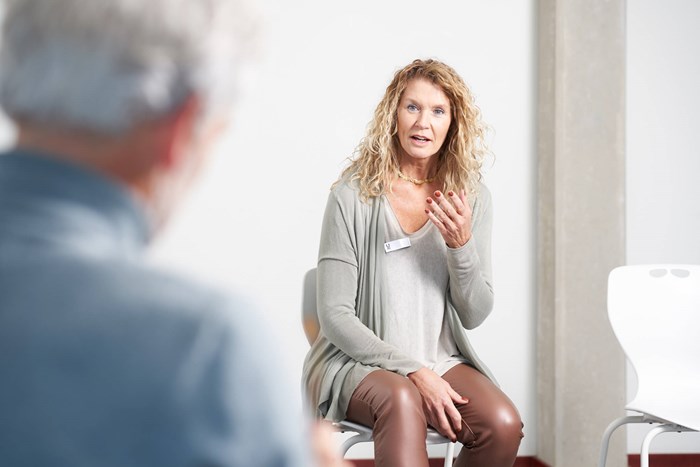How to recognise PTSD
PTSD-symptoms
The shock of living through or witnessing distressing events is difficult to process. So difficult, in fact, that it can result in Post-traumatic Stress Disorder. PTSD-symptoms can keep you from living a happy, healthy life. Do you want to know more about PTSD-symptoms and their impact? Find out below.
Communication center
Speak with a professional
Want to learn more about PTSD?
We’d be happy to help you with all your questions. Feel free to contact us.
Or call us on 0031-343556400
What are the symptoms of PTSD?
PTSD varies for everyone suffering from it. Some people experience the same symptoms for months or even years on end, while others push the event away and attempt to switch off their emotions entirely. However, many symptoms are recognisable across the board and are classified as either emotional or physical.
Please remember that your situation doesn’t have to be permanent and that U-center can help you overcome your PTSD-symptoms.

Emotional PTSD symptoms
Suffering from trauma comes with frequent unexpected flashbacks or an irritable. You could have trouble controlling your emotions or you could feel numb. But there are other emotional symptoms that could be part of your PTSD without you knowing it.
1. Intrusive symptoms
Involuntary and unwanted intrusive memories are a common emotional symptom of PTSD. Flashbacks might make you feel like the traumatic event is happening all over again, nightmares might keep you from a good night’s sleep or something in your environment might trigger a severe emotional reaction because it reminds you of the traumatic event.
The following could trigger a severe emotional reaction with PTSD:
- Seeing images of the event, whether they are only partial images or a complete image
- Some tastes, smells or sounds that you relate to the traumatic event
- Physical sensations (pain, pressure, a certain type of touch…)
- Feeling the emotions you felt when you were experiencing the event
2. Denial or Avoidance
If you suffer from PTSD, you might try everything in your power to stay as far away from the traumatic event as possible. You can attempt to stop thinking or talking about it or you might keep your distance from certain places, activities or people that remind you of what happened to you.
Many people who suffer from PTSD try to push the event as far away as possible, often trying to distract themselves by keeping as busy as possible. However, this can lead to isolation, making you miss out on activities you used to enjoy.
3. Negative changes in mood or cognition
Feelings of guilt or shame
Intrusive memories are not necessarily the symptoms you experience. You could maybe feel an overwhelming feeling of guilt or shame, making you think that you’re somehow to blame for what happened. For instance, maybe you wonder why this has happened to you at all, or if there’s anything you could have done to stop it from happening in the first place.
Depressive feelings or sadness
PTSD is a complex mental illness, and it can trigger many emotional symptoms that are associated with other mental illnesses. One of them is feeling depressed or sad. You might feel certain symptoms that are often associated with depression, such as thinking negatively about yourself or your environment, having no more interest in activities you used to like and having trouble with finding a positive emotion.
Feeling numb
For some people with PTSD, the symptoms become too much. They might attempt to not feel anything at all, known as emotional numbing.
4. Hyperarousal or feeling on edge
A final symptom of PTSD is anxiety and having trouble relaxing. This could be a symptom for you if you are hyper-aware of threats and easily startled. This could not only lead to irritability or anger, but also to insomnia and having trouble with concentration.
A few ways in which you might feel this PTSD-symptom are:
- Feeling overwhelming panic when you are reminded of the traumatic event
- Hypervigilance
- Sleeping less or not at all
- Difficulty concentrating
Fear or stress
PTSD, for you, might result in getting frightened quickly because you’re always expecting danger (this could be happening in your subconsciousness). For instance, it’s possible that your fears trigger a fight or flight response, but it’s also possible that you experience extreme stress because you feel like you’re in danger.
Irritability or anger
You might feel frustrated, angry, or even aggressive. If you find yourself picking fights, yelling, or slamming doors often, this might be due to a state of hyperarousal caused by PTSD. But your anger doesn’t have to be so apparent. You could also notice this by feeling your muscles tense or your heart race. Or, in a final instance, your anger could also be manifesting in your mind, through your thoughts.
Short waiting times Start your treatment quickly
U-center is an expert in comorbidity We treat everything at once
Short & intensive treatment Make a U-turn in your life
Physical PTSD symptoms
You might have to deal with physical PTSD-symptoms, too. The body stores trauma, meaning that it remains in a constant state of vigilance, triggering a fight or flight response.
Natural reactions & patterns
PTSD alters your natural reactions and biological patterns, causing extreme reactions similar to those you experienced during the traumatic event, even when there is no actual threat. That hypervigilance makes you overanalyse your environment, which in turn makes it difficult to decide if you’re actually in danger or not.
It’s possible that this is caused by the cortisol and adrenaline that are released when we feel stressed emotionally. It’s the body's automatic way of preparing to respond to a threat, sometimes called the 'fight, flight or freeze' response.
Studies have shown that someone with PTSD will continue producing these hormones when they're no longer in danger, which could explain some symptoms such as extreme alertness and being startled easily.
Anxiety (reactivity to triggers)
It’s possible that you feel fearful or stressed constantly, making you assume danger is everywhere. That doesn't just make you more susceptible to triggers, but it also results in other symptoms typically associated with anxiety. Some of these include an elevated heartbeat and nervous sweating.
Fatigue
The hypervigilance and anxiety that is caused by PTSD, could make you feel more tired more often. In fact, PTSD often occurs side by side with Chronic Fatigue Syndrome. You might feel like your energy is down or that you could take a nap every hour. Fortunately, U-center specialises in the treatment of comorbidity cases.
Aches
The high cortisol levels caused by the stress of having PTSD can make you more sensitive to pain in the long run. That doesn’t mean that you can’t handle the same type of pain as well as you used to anymore, but rather that you experience the pain more intensely than before.
Moreover, stress and hypervigilance can cause you to be more tense, which in turn has an impact on your muscles and joints.
U-center can help you
These symptoms are challenging and they may be keeping you from a normal and healthy life. But this situation does not have to be permanent or normal for you. Together, we can help you overcome these symptoms and get you on your way to a normal and even happy life.
See our treatments
Intensity of PTSD-symptoms
PTSD symptoms can vary in intensity over time. You may have more PTSD symptoms when you're stressed in general, or when you come across reminders of what you went through. For example, you may hear a car backfire and relive combat experiences. Or you may see a report on the news about a sexual assault and feel overcome by memories of your own assault.
The risks of not treating PTSD
Trauma survivors can feel the repercussions of traumatic events for years on both their minds and bodies. Do you want to know more about the long-term effects of PTSD and the importance of PTSD-treatment? You can find all the information on our treatment page.
Recovery at U-center
U-center treats PTSD with a variety of therapies in a 7-week inpatient treatment. But we never treat the disorder as an isolated problem. We focus on you as a person and we take all other problems into account when we design your personalised treatment programme.
Do you want to learn more about how U-center guides you on the road to recovery?
Our treatment
Need help recovering from PTSD?
Are you looking for a mental health centre that treats PTSD and multiple disorders (comorbidity)? At U-center, you’ll enter a short and intense programme that helps you tackle your trauma and the underlying problems. Would you like to know more? Contact us, we’d love to answer any questions you might have!
